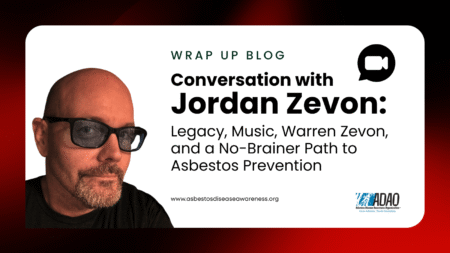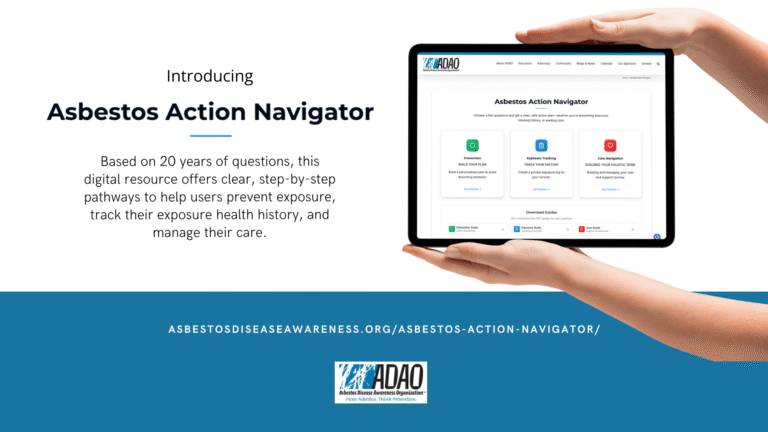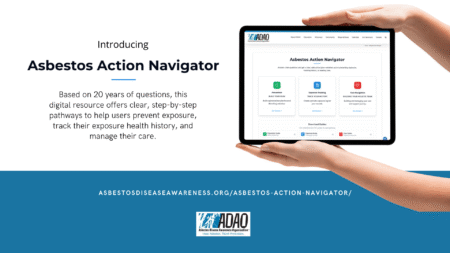Conversation with Jordan Zevon: Legacy, Music, Warren Zevon, and a No-Brainer Path to Asbestos Prevention
Recorded via Zoom on October 20, 2025 — Hosted by ADAO

When the Asbestos Disease Awareness Organization gathered online for a special conversation with Jordan Zevon, the tone was intimate, reflective, and unmistakably real. For twenty years, Jordan has stood beside ADAO as its National Spokesperson, using his platform to turn personal loss into lasting purpose and change. Over the course of an hour, we revisited memories of his father, the legendary songwriter Warren Zevon, reflected on the impact of mesothelioma, and reminded everyone why prevention and policy still matter.
Jordan began by describing his childhood in Los Angeles, surrounded by creativity yet defined by small, ordinary moments rather than celebrity status. “We just wanted to go have lunch or go do something,” he said. “And at the end of those lunches, he’d play me one of his new songs on his cassette recorder. That was incredible.” Music, as he noted, was always present but rarely discussed because it was simply a part of life. He learned two lessons from his father that still guide his work: writing is hard, and a great title can carry a song. He smiled, recalling how Warren’s meticulous approach to his craft produced songs like Desperados Under the Eaves: “It’s such a deep, layered song. You pull up the harmonies and it’s like this Beach Boys-level thing; it’s no wonder I love it so much.”
The conversation turned somber as Jordan remembered the day his father called to share his diagnosis. “I literally remember that the world turned dark after that,” he said quietly. “There was life before that and after that.” Watching both his parents face serious illnesses, Jordan saw true courage expressed not through denial but in choosing how to face it. “He just wanted to power through it,” Jordan explained. “He said, ‘This is the hand I’m dealt, and I’m going to play it.’” Those months, though devastating, revealed to Jordan “what strength really looks like.”
When Warren began recording The Wind, his final, Grammy-winning album, Jordan stepped in to manage the swirl of logistics: artists, interviews, and production. “Luckily, I had an autopilot that had been informed by years in music,” he recalled. “I just knew what to do.” That focus carried him through grief and into advocacy. “I promised Dad he’d be busier than Hendrix, and I’ve kept that promise.”
Two decades later, Jordan’s mix of humor and candor has made him one of the powerful voices for ADAO. “People want to know, but they don’t want to know,” he said. “It’s this balance of trying to inform without being fearful.” His message to lawmakers about the Alan Reinstein Ban Asbestos Now Act was direct: “Wake the f— up. Do the no-brainer stuff you’re paid to do. Do your job.” Beneath the wit was a solemn reminder that prevention must replace complacency: “We’ll tackle the whole damn thing,” he said, “inform people without making them fearful.”
Music remains his language for healing. Performing Keep Me in Your Heart for ADAO events is both a tribute and a test of composure. “I don’t know if I’ve ever fully let that song in,” he admitted. “I’d just be an emotional wreck. But I love playing it whenever you ask me to.” Another of his father’s songs, Don’t Let Us Get Sick, continues to move him deeply: “That song messes me up. It’s powerful.”
This fall brings two milestones that connect art and advocacy. On October 24, the sold-out Join Me in L.A. tribute concert, produced by Wild Honey Foundation, will unite artists such as Jackson Browne and Dwight Yoakam in support of ADAO and the Ed Asner Family Center. “It’s the best of both worlds,” Jordan said. “Just mind-blowing.” Then, on November 8, Warren Zevon will at last be inducted into the Rock & Roll Hall of Fame. “He’s in. Let’s do this,” Jordan laughed. “I really didn’t think it would happen, but it did, and it’s amazing.”
As the conversation drew to a close, Jordan reflected on what he would tell his dad today. “I’d let him know I kept him busy as promised,” he said. “People like to see the process – to see the journey these songs take.” Then, with a grin, he added, “And I’d love to go see Die Hard again with you.”
The Zoom audience lingered afterward, aware they had witnessed something more than just an interview. It was a reminder of how love, creativity, and advocacy intertwine. Jordan’s story bridges art and public health, proving that legacy can be both personal and profoundly civic.
Take Action: Share a fact, share your story, and support ADAO’s work to pass a complete, court-resilient asbestos ban. Prevention is the cure, and, as Jordan reminded everyone, it’s a no-brainer.
Jordan, thank you for twenty years of turning loss into purpose and for your unwavering voice for all those affected by preventable asbestos-caused diseases.
Love, Linda


